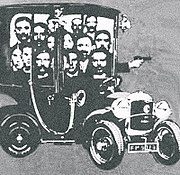Kontraŭleĝismo


Kontraŭleĝismo estas tendenco kaj filozofio ene de anarkiismo kiu disvolviĝis ĉefe en Francio, Italio, Belgio, kaj Svisio dum la komencaj 1900-aj jaroj kiel elkreskaĵo de individuisma anarkiismo.[1][2] La Kontraŭleĝistoj malferme adoptis krimemon kiel vivostilo.
Historio
[redakti | redakti fonton]Kontraŭleĝismo aperis ĉe generacio de eŭropanoj inspirita de agado de la 1890-aj jaroj, dum kiu Ravachol, Émile Henry, Auguste Vaillant, kaj Caserio faris krimojn en profito de anarkiismo, laŭ tio kio estas konata kiel propagando pro agado.
Influitaj de la egoismaj teorioj de la pensulo Max Stirner,[3] la Kontraŭleĝistoj en Francio apartiĝis el anarkiistoj kiaj Clément Duval kaj Marius Jacob kiu justigis ŝteladon per teorio de la reprise individuelle (en Esperanto: individua reklamado). Anstataŭe, la Kontraŭleĝistoj argumentis ke iliaj agadoj ne postulis moralan bazon - kontraŭleĝaj agoj estis konsiderataj ne en la nomo de pli alta idealo, sed cele de propraj deziroj. "En Parizo, tiu etoso estis centrita al ĉiusemajna gazeto, nome L’Anarchie kaj al Causeries Populaires (nome regulaj diskutgrupoj kunside en kelkaj diversaj lokoj en kaj ĉe la ĉefurbo ĉiusemajne), ambaŭ el kiuj estis fonditaj de Albert Libertad kaj liaj kunuloj".[4]
Proponantoj kaj aktivuloj de tiu taktiko inter aliaj estis Johann Most, Luigi Galleani, Victor Serge, kaj Severino Di Giovanni. "En Argentino, tiuj tendencoj floris je la fino de la 20-aj kaj dum la 30-aj, jaroj de akra subpremado kaj de malgrandiĝo de la iama pova laborista movado –tio estis malespero, kvankam heroa, de dekadenca movado."[5]
En Francio la Bando de Bonnot estis la plej fama grupo kiu aliĝis al Kontraŭleĝismo.
Vidu ankaŭ
[redakti | redakti fonton]Notoj
[redakti | redakti fonton]- ↑ "The illegalisis in this study,... As anarchist individualists, they came from a milieu whose most important theoretical inspiration was unduubtedly Max Stimer — whose work The Ego and Its Own remains the most powerful negation of the State, and affirniation of the individual, to date."— Richard Parry, The Bonnot Gang: the history of the French illegalists], 1987, p. 5.
- ↑ "Parallel to the social, collectivist anarchist current there was an individualist one whose partisans emphasized their individual freedom and advised other individuals to do the same... Some individualists rebelled by withdrawing from the economy and forming voluntary associations to achieve self-sufficiency. Others took the route of illegalism, attacking the economy through the direct individual reappropriation of wealth. Thus theft, counterfeiting, swindling and robbery became a way of life for hundreds of individualists, as it was already for countless thousands of proletarians.—"THE "ILLEGALISTS"" de Doug Imrie (el Anarchy: a Journal Of Desire Armed, Aŭtune-Vintro, 1994–95)
- ↑ "a new generation of anarchists, spurred on by the individualist' ideas of Max Stirner, were to take as their point of departure exactly what Jean Grave objected to, that the rebel who secretly stole was no more than an ordinary thief. The developing theory of 'illegalism' had no moral basis, recognizing only the reality of might in place of a theory of 'right'. Illegal acts were to be done simply to satisfy one's desires, not for the greater glory of some external 'ideal'. The illegalists were to make a theory of theft without the embarrassment of theoretical justifications." — Richard Parry. The Bonnot Gang: the history of the French illegalists. 1987.
- ↑ Richard Parry. The Bonnot Gang: the history of the French illegalists. 1987. p. 5.
- ↑ http://news.infoshop.org/article.php?story=20061228140637965 Arkivigite je 2012-09-21 per la retarkivo Wayback Machine Notoj ĉe la artikolo "Anarchism, Insurrections and Insurrectionalism" de: Collin Sick]
Bibliografio
[redakti | redakti fonton]- Parry, Richard. (1986) The Bonnot Gang. Rebel Press. ISBN 0-946061-04-1.[1]
- "The "illegalists" de Doug Imrie. El "Anarchy: a Journal Of Desire Armed", Fall-Winter, 1994-95 Arkivigite je 2015-09-08 per la retarkivo Wayback Machine
- Cacucci, Pino. (2006-07-25) Without a Glimmer of Remorse. Christie Books. ISBN 1-873976-28-3.
- On Illegalism and Ultra-Leftism. Philippe Gavi, J-P Sartre, & Pierre Victor. Gallimard, Paris, 1974
- "Illegalism and Insurrectionary Anarchism" de Freedom Arkivigite je 2012-03-06 per la retarkivo Wayback Machine
